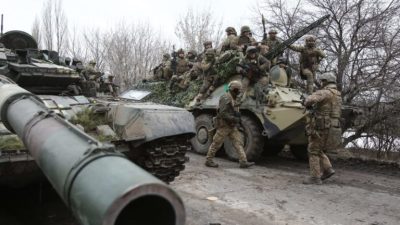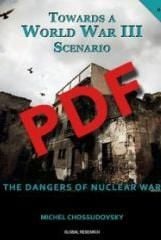The Spread of the Culture of War

All Global Research articles can be read in 51 languages by activating the “Translate Website” drop down menu on the top banner of our home page (Desktop version).
To receive Global Research’s Daily Newsletter (selected articles), click here.
Visit and follow us on Instagram, Twitter and Facebook. Feel free to repost and share widely Global Research articles.
***
Updated on May 22 to embed the video interview.
Participating in this special episode of Grandangolo is Prof. Michel Chossudovsky, director of the Center for Research on Globalization (Canada), who traces the historical and geopolitical scenario of the war in Ukraine: provoked by the US-NATO strategy against Russia, it threatens to lead the world to nuclear war.
Participating in the exercise alongside the military are university students from 11 Italian universities, including Milan’s Università Cattolica del Sacro Cuore, Venice’s Ca’ Foscari, Bologna’s Alma Mater Studiorum, Pisa’s Scuola Superiore Sant’Anna, Rome’s La Sapienza and Naples’ Federico II. Students are embarked on warships in the roles of political advisor and legal advisor, to “provide political legitimacy and legal framing” for military action. This operation is part of the dissemination of the culture of war, which is functional to the military preparation for war.
The culture of war is disseminated by the political-media apparatus in several ways: the very serious risk to which Europe is exposed with the further enlargement of NATO to Sweden and Finland is concealed; Ukrainian neo-Nazism is made to disappear by presenting the Azov regiment as a bulwark of “resistance”; anti-Russian hatred is stoked by going so far as to expel a Russian violinist from an international competition in Gorizia.
*
Note to readers: Please click the share buttons above or below. Follow us on Instagram, Twitter and Facebook. Feel free to repost and share widely Global Research articles.
This article was originally published in Italian on byoblu.
Manlio Dinucci, award winning author, geopolitical analyst and geographer, Pisa, Italy. He is a Research Associate of the Centre for Research on Globalization (CRG).
Featured image: Ukrainian troops prepare to fight Russian forces in Donbass (Source: Indian Punchline)
 “Towards a World War III Scenario: The Dangers of Nuclear War”
“Towards a World War III Scenario: The Dangers of Nuclear War”
by Michel Chossudovsky
Available to order from Global Research!
ISBN Number: 978-0-9737147-5-3
Year: 2012
Pages: 102
PDF Edition: $6.50 (sent directly to your email account!)
Michel Chossudovsky is Professor of Economics at the University of Ottawa and Director of the Centre for Research on Globalization (CRG), which hosts the critically acclaimed website www.globalresearch.ca . He is a contributor to the Encyclopedia Britannica. His writings have been translated into more than 20 languages.
Reviews
“This book is a ‘must’ resource – a richly documented and systematic diagnosis of the supremely pathological geo-strategic planning of US wars since ‘9-11’ against non-nuclear countries to seize their oil fields and resources under cover of ‘freedom and democracy’.”
–John McMurtry, Professor of Philosophy, Guelph University
“In a world where engineered, pre-emptive, or more fashionably “humanitarian” wars of aggression have become the norm, this challenging book may be our final wake-up call.”
-Denis Halliday, Former Assistant Secretary General of the United Nations
Michel Chossudovsky exposes the insanity of our privatized war machine. Iran is being targeted with nuclear weapons as part of a war agenda built on distortions and lies for the purpose of private profit. The real aims are oil, financial hegemony and global control. The price could be nuclear holocaust. When weapons become the hottest export of the world’s only superpower, and diplomats work as salesmen for the defense industry, the whole world is recklessly endangered. If we must have a military, it belongs entirely in the public sector. No one should profit from mass death and destruction.
–Ellen Brown, author of ‘Web of Debt’ and president of the Public Banking Institute


